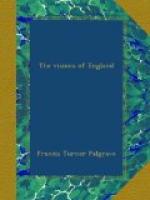A brother’s hypocrite tears; Murray, in whose interest Riccio was murdered, and whose privity to the murder (as afterwards to that of Darnley) is reasonably, though indirectly, proved, affected to shed tears on seeing his sister. Next day she learned the details of the plot, and her half-brother’s share in it.
The flight; Mary then fled by a secret passage from Holyrood Palace through the Abbey Church, the royal tombs which had been broken open by the revolutionary mob of 1559.
The Castle; Dunbar.
Till the terrible Day unreveal’d; See Appendix A.
SIDNEY AT ZUTPHEN
October 2: 1586
1
Where Guelderland outspreads
Her green wide water-meads
Laced by the silver of the parted Rhine;
Where round the horizon low
The waving millsails go,
And poplar avenues stretch their pillar’d
line;
That morn a clinging mist uncurl’d
Its folds o’er South-Fen town, and blotted out
the world.
2
There, as the gray dawn broke,
Cloked by that ghost-white cloke,
The fifty knights of England sat in steel;
Each man all ear, for eye
Could not his nearest spy;
And in the mirk’s dim hiding heart they feel,
—Feel more than hear,—the
signal sound
Of tramp and hoof and wheel, and guns that bruise
the ground.
3
—Sudden, the mist gathers up like a curtain, the theatre clear; Stage of unequal conflict, and triumph purchased too dear! Half our boot treasures of gallanthood there, with axe and with glaive, One against ten,—what of that?—We are ready for glory or grave! There, Spain and her thousands nearing, with lightning-tongued weapons of war;— Ebro’s swarthy sons, and the bands from Epirus afar; Crescia, Gonzaga, del Vasto,—world-famous names of affright, Veterans of iron and blood, insatiate engines of fight:— But ours were Norris and Essex and Stanley and Willoughby grim, And the waning Dudley star, and the star that will never be dim, Star of Philip the peerless,—and now at height of his noon, Astrophel!—not for thyself but for England extinguish’d too soon!
4
Red walls of Zutphen behind; before them, Spain in her might:— O! ’tis not war, but a game of heroic boyish delight! For on, like a bolt-head of steel, go the fifty, dividing their way, Through and over the brown mail-shirts,—Farnese’s choicest array; Over and through, and the curtel-axe flashes, the plumes in their pride Sink like the larch to the hewer, a death-mown avenue wide: While the foe in his stubbornness flanks them and bars them, with merciless aim Shooting from musket and saker a scornful death-tongue of flame. As in an autumn afar, the Six Hundred in Chersonese hew’d Their road through a host, for their England and honour’s sake wasting their blood, Foolishness wiser than wisdom!—So these, since Azincourt morn, First showing the world the calm open-eyed rashness of Englishmen born!




